 This Spotlight highlights how DRK-12 projects are advancing the field of algebra education through innovative technologies, teacher professional development, curriculum impact studies, meta-research, and strategic partnership development. Eight projects describe their interventions, research questions, initial findings, and strategies for addressing key challenges. PIs also offer advice for others considering research and development in algebra education.
This Spotlight highlights how DRK-12 projects are advancing the field of algebra education through innovative technologies, teacher professional development, curriculum impact studies, meta-research, and strategic partnership development. Eight projects describe their interventions, research questions, initial findings, and strategies for addressing key challenges. PIs also offer advice for others considering research and development in algebra education.
In this Spotlight...
- Featured DRK-12 Projects
- CAREER: Covariational and Algebraic Reasoning: A New Path to Algebra (PI: Teo Paoletti)
- CAREER: Exploring Teacher Noticing of Students' Multimodal Algebraic Thinking (PI: Janet Walkoe)
- CAREER: From Research to Meta-Research to Practice – The Development of an Educational Learning Environment Framework for School Algebra (PI: Sheree Sharpe)
- CAREER: Implementing Mathematical Modeling for Emergent Bilinguals (PI: Ji Yeong I)
- Developing Concept of Variable Among Students with Mathematics Difficulties in Preparation for Algebra 1 (PI: Sarah Krowka)
- Establishing a Partnership Between a Rural School and an Urban University to Support Algebra 1 Learning for Students with Learning Disabilities (PI: Casey Hord)
- Practice-Driven Professional Development for Algebra Teachers (PI: Zandra de Araujo)
- The Impact of an Inclusive Grades K-2 Early Algebra Intervention Implemented by Classroom Teachers (PI: Maria Blanton)
- Related Resources
See the 2019 Spotlight on Algebra Education in DRK-12.
Featured Projects
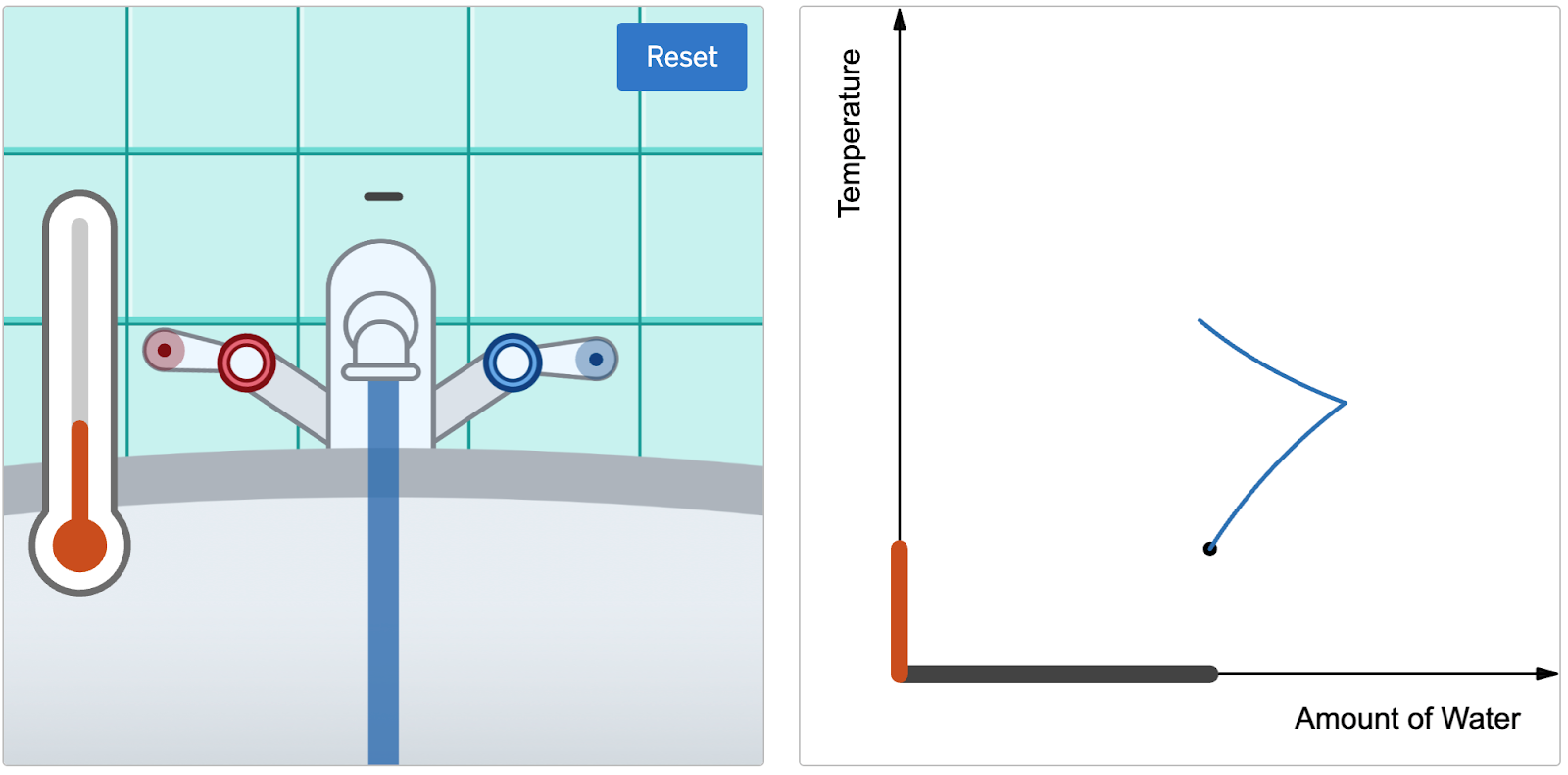 CAREER: Covariational and Algebraic Reasoning: A New Path to Algebra (Project CARe)
CAREER: Covariational and Algebraic Reasoning: A New Path to Algebra (Project CARe)
PI: Teo Paoletti
Grade Levels: 6–8
Project Description: The goal of Project CARe is to explore how new technologies can create a path into algebra that allows students to build algebraic knowledge from their intuitive reasoning about how quantities change together (i.e., covariational reasoning). For example, we explore how students learn to solve equations and inequalities as they compare two changing quantities in a dynamic digital recreation of real-life situations. This design-based research project consists of cycles of design, implementation, and refinement. We conduct these cycles within small-group and whole-class settings, with a focus on students from historically marginalized populations. These iterative cycles help us generate new insights into how students think about the math topics we’re interested in. This process also supports the development of tasks designed to promote students’ algebra learning in novel ways. Ultimately, we aim for these tasks to be used in classrooms and other educational settings. To ensure that teachers can successfully implement Project CARe tasks, all tasks will be reviewed by a group of experienced mathematics teachers, teacher leaders, researchers, and technology experts. To increase accessibility, all tasks are made available through the Desmos Activity Builder platform.
Project CARe helps lay a foundation for integrating education and research at the intersection of students’ algebra learning, covariational reasoning, new educational technologies, and supporting students from historically marginalized populations. Difficulties in algebra have traditionally served as a barrier for student access to STEM coursework and careers, and insights from Project CARe have the potential to transform school curricula and improve student success in algebra.
Research Questions:
- How can middle-school students’ covariational reasoning serve as a foundation for their development of algebraic reasoning and knowledge?
- What general paths support students developing algebraic reasoning and knowledge via their covariational reasoning?
Key Challenges and Strategies for Addressing Them: One key challenge in our work is designing tasks with the complexity of whole-class instruction in mind. In the early phases of developing a task or task sequence, we conduct multiple rounds of teaching experiments with small groups of students (2–3 students). These teaching experiments allow us to iteratively and responsively design tasks while also building models of students' mathematics to understand how they are reasoning as they engage in tasks and learning about key concepts. However, sometimes what works in a small-group setting doesn’t translate neatly to a whole-class teaching experiment because of differences in instructional environment. Building relationships with school personnel and getting to know the teachers and students that we work with has gone a long way in helping us address some of these challenges.
A second challenge we have experienced relates to our use of technology. Although we initially designed tasks exclusively for the Desmos platform, we have learned that middle-school students do not prefer to spend class time exclusively in front of a Chromebook. As such, we have been designing tasks that are adaptable for use both through Chromebooks and physical manipulatives and/or paper-and-pencil tasks. We have found students appreciate this change in instructional medium during whole-class teaching experiments.
Advice for Researchers: Algebra education is such a broad space, which can make synthesizing research and ideas quite difficult. Sometimes when someone says “algebra” they may mean the notation, like using and manipulating variables. Other times “algebra” means algebraic ways of reasoning about changing quantities, generalized arithmetic, and/or mathematizing situations.
We find it helpful to think about algebra as a web of representational tools and ways of thinking and determine which specific piece(s) of that web you are interested in exploring more deeply. Algebra is also very cross-disciplinary, especially with other STEM subjects. There is a lot of potential for integrating algebra reasoning with other topics, so consider seeking out and leveraging this interconnectedness with other areas in which you are interested/have expertise.
Initial Findings: We have generated multiple publications, proceedings, and presentations to share our findings with the broader research community. Our findings include describing ways we use existing frameworks to analyze and promote student’s covariational reasoning and graphing meanings (Gantt et al., 2023; Paoletti et al., 2024a), providing task design principles we have found effective in our work (Margolis et al., 2024, Paoletti et al., 2024b), and highlighting novel ways of reasoning about graphical observations we observed students’ leveraging (Olshefke-Clark et al., (2024).
Products:
- Project CARe Website
- Publications
- Paoletti, T., Moore, K. C., & Vishnubhotla, M. (accepted). Intellectual need, covariational reasoning, and function: Freeing the horse from the cart. The Mathematics Educator.
- Paoletti, T., Stevens, I. E., Acharya, S., Margolis, C., Olshefke-Clark, A., & Gantt, A. L. (2024a). Exploring and promoting a student’s covariational reasoning and developing graphing meanings. The Journal of Mathematical Behavior, 74, 101156. https://doi.org/10.1016/j.jmathb.2024.101156
- Paoletti, T., Gantt, A., Acharya, S., & Margolis, C. (2024). Task design principles to support graph reasoning. In Evans, T., Marmur, O., Hunter, J., Leach, G., & Jhagroo, J. (Eds.) (2024b). Proceedings of the 47th Conference of the International Group for the Psychology of Mathematics Education (Vol. 1). Auckland, New Zealand: PME (pp. 287).
- Margolis, C., Paoletti, T., & Olshefke, A. (2024). Emerging Principles of Digital Task Design to Support Students’ Developing Graphing Meanings. In Evans, T., Marmur, O., Hunter, J., Leach, G., & Jhagroo, J. (Eds.) (2024). Proceedings of the 47th Conference of the International Group for the Psychology of Mathematics Education (Vol. 1). Auckland, New Zealand: PME (pp. 282).
- Olshefke-Clark, A., Paoletti, T., Margolis, C., Gantt, A., Lee, H. Y., & Hardison, H. L. (2024). Different ways students interpret axes on graphs. In Evans, T., Marmur, O., Hunter, J., Leach, G., & Jhagroo, J. (Eds.) (2024). Proceedings of the 47th Conference of the International Group for the Psychology of Mathematics Education (Vol. 1). Auckland, New Zealand: PME (pp. 198).
- Margolis, C., Paoletti, T., & Olshefke, A. (2024). Digital Task Design to Support Students’ Developing Graphing Meanings. In S. Cook (Eds.). Proceedings of the 26th Annual Conference on Research in Undergraduate Mathematics Education.
- Gantt, A. L., Paoletti, T., Acharya, S. V., & Margolis, C. (2023). Bridging situational and graphical reasoning to support emergent graphical shape thinking. In T. Lamberg & D. Moss (Eds.) Proceedings of the forty-fifth annual meeting of the North American Chapter of the International Group for the Psychology of Mathematics Education (Vol. 1). University of Nevada, Reno. https://www.pmena.org/pmenaproceedings/PMENA%2045%202023%20Proceedings%20Vol%201.pdf
- Presentations
- Olshefke, A., Paoletti, T., Margolis, C., Gantt, A., Lee, H. Y., & Hardison, H. L. (2024, July). Different ways students interpret axes on graphs. Paper presented at the 47th annual meeting of the International Group for the Psychology of Mathematics Education. Auckland, New Zealand.
- Margolis, C., Paoletti, T., & Olshefke, A. (2024, July). Emerging Principles of Digital Task Design to Support Students’ Developing Graphing Meanings. Poster presented at the 47th annual meeting of the International Group for the Psychology of Mathematics Education. Auckland, New Zealand.
- Paoletti, T., Gantt, A., Acharya, S., & Margolis, C. (2024, July). Task design principles to support graph reasoning. Poster presented at the 47th annual meeting of the International Group for the Psychology of Mathematics Education. Auckland, New Zealand.
- Paoletti, T., Acharya, S., Gantt, A., & Margolis, C. (2024, July). Moving beyond ‘Over-and-up’: One student’s productive shifts in point plotting and graphing activity. Paper presented at the 15th International Congress on Mathematical Education. Sydney, Australia.
- Margolis, C., Paoletti, T., Gantt, A., & Acharya, S. (2024, July). The impact of immediate graphical feedback on students’ goal-directed activity. Paper presented at the 15th International Congress on Mathematical Education. Sydney, Australia.
- Paoletti, T. (2024, April). Supporting students’ meanings for graphs as representing two changing quantities. Presentation for the Department of Mathematical and Statistical Sciences University of Colorado Denver Spring, 2024 Seminar Series. Denver, CO.
- Margolis, C., Paoletti, T., & Olshefke, A. (2024, February). Digital Task Design to Support Students’ Developing Graphing Meanings. Paper presented at the 26th Annual Conference on Research in Undergraduate Mathematics Education, Omaha, NE.
- Gantt, A. L., Paoletti, T., Acharya, S., Margolis, C. (2023, October). “Like reverse psychology”: Supporting middle schoolers’ graphical reasoning. Paper presented at the National Council for Teachers of Mathematics Annual Research Conference.
- Paoletti, T., Gantt, A. L., Acharya, S., Grant, K., & Bieryla, E. (2023, October). The Growing Triangle Task: Using Desmos to support students’ understandings of graphs and non-linear change. Presentation at the National Council for Teachers of Mathematics Annual Meeting & Exposition.
- Gantt, A. L., Paoletti, T., Acharya, S., Grant, K., & Bieryla, E. (2023, October). Growing Triangle/Rectangle: A Desmos task for diving deeply into linear and nonlinear relationships. Presentation at the National Council for Teachers of Mathematics Annual Meeting & Exposition.
- Gantt, A. L.,Paoletti, T., Acharya, S., & Margolis, C. (2023, October). Bridging situational and graphical reasoning to support emergent graphical shape thinking. Paper presented at the forty-fifth annual meeting of the North American Chapter of the International Group for the Psychology of Mathematics Education. Reno, NV.
- Paoletti, T., Gantt A. L., Acharya, S. V., & Margolis, C. (2023, June). CAREER: Covariational and Algebraic Reasoning: A New Path to Algebra. Poster presented at the Discovery Research PreK-12 PI Meeting, Arlington, VA.
 CAREER: Exploring Teacher Noticing of Students' Multimodal Algebraic Thinking
CAREER: Exploring Teacher Noticing of Students' Multimodal Algebraic Thinking
PI: Janet Walkoe
Grade Levels: Most of our lab’s work has been with middle school teachers and students, but we believe that multimodal teacher noticing has applications to support teachers and students in the classroom throughout K-12 education.
Project Description: Our work investigates teacher noticing of children’s expressed “seeds” of algebraic thinking. These seeds are sub-conceptual resources coming from life experience that students call upon when responding to mathematical prompts; an example is thinking about the idea of balance when solving an equation. We design video clubs using Anotemos video annotation software to support teachers in learning to notice students’ multimodal algebraic thinking. A novel contribution of this work is the focus on multimodal expression: our video clubs encourage teachers to look for evidence of thinking in gesture, action, and other modalities as well as verbal. Students do not always possess the formal vocabulary to express their algebraic thinking, so attending and responding to these other forms of expression are very important for teachers.
Research Questions:
- What multimodal algebraic thinking do teachers notice?
a. What seeds of algebraic thinking do teachers attend to?
b. What ways of expressing algebraic resources are particularly salient to teachers (i.e., gesture, speech, body movement)?
c. How do teachers make sense of these moments for the purposes of algebra instruction while teaching? - What design features of a video club, such as video annotation tools, support teachers’ multimodal noticing (TMN) of student algebraic thinking?
Key Challenges and Strategies for Addressing Them: Trying to bridge lived experiences to classroom practice is not cut and dry! There’s lots of individual differences and other factors that mean we won’t see the same ideas from every student, the same recognition in every classroom, or the same kind of talk about these ideas from every teacher. Pushing teachers to consider the core idea of the seeds framework—that kids are leveraging lived experience to learn in math—has been a much more successful strategy, for example, than having them hunt and identify individual seeds in video clubs.
Advice for Researchers: Consideration of multimodal expressions of thinking are critically important in algebra education. Broadening teachers’ perspectives beyond students’ verbal understanding can help them better support all students. This perspective also has positive implications for supporting students with home languages other than English, who may not yet have the formal vocabulary to express their ideas verbally in the classroom.
Initial Findings: Introducing teachers to a Seeds of Algebraic Thinking framework helps them take a more resources-based perspective (lens) to student algebraic thinking.
Products:
- Seeds Website (educator facing)
- Publications
- Walton, M., & Walkoe, J. (2024). Using a video-tagging tool to support facilitators of video-based professional development. The AMTE Handbook of Mathematics Teacher Education: Reflection on Past, Present and Future–Paving the Way for the Future of Mathematics Teacher Education, Volume 5, 245.
- Walkoe, J., Williams-Pierce, C. C., Flood, V. J., & Walton, M. (2023). Toward professional development for multimodal teacher noticing. Journal for Research in Mathematics Education, 54(4), 279-285.
- Walkoe, J., Walton, M., & Levin, M. (2022). Supporting teacher noticing of moments of algebraic potential. 수학교육학연구, 32(3), 271-286.
- Levin, M., & Walkoe, J. (2022). Seeds of algebraic thinking: A Knowledge in Pieces perspective on the development of algebraic thinking. ZDM–Mathematics Education, 54(6), 1303-1314.
- Workshop Presentation: Video Tagging and Video Clubs, AMTE 2022
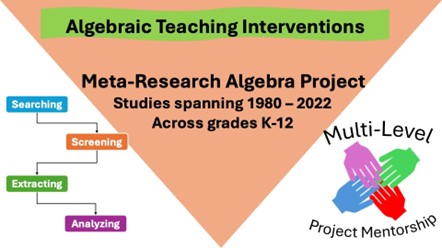 CAREER: From Research to Meta-Research to Practice – The Development of an Educational Learning Environment Framework for School Algebra
CAREER: From Research to Meta-Research to Practice – The Development of an Educational Learning Environment Framework for School Algebra
PI: Sheree Sharpe
Grade Levels: K–12
Project Description: The Meta-Research Algebra Project advances the understanding of teaching and learning algebra in grades K through 12 by using a methodology that leverages the cumulative power of many studies into one detailed analysis. The project is a systematic review and meta-research of empirical algebraic studies in the U.S. across grades K–12 between 1980 and 2022. Systematic review is the process of methodically searching and screening studies. Meta-Research is a mixed methods analysis that includes a meta-analysis on quantitative studies and a meta-synthesis on qualitative studies. The goal of the meta-analysis is to investigate the effectiveness of algebraic teaching interventions. The goal of the meta-synthesis is to describe the characteristics of effective algebraic teaching interventions across algebraic topics and grade levels. The meta-synthesis will also investigate the links between algebraic topics, algebraic teaching interventions, and students’ mathematical learning. Algebraic Teaching Interventions are strategies, materials, experiences, and instructions provided by the researcher/teacher in the classroom that are different from business-as-usual, with the goal of improving the teaching and learning of algebraic content. This project also employs a multi-level mentorship plan, where the PI mentors the postdoc and graduate students, and the postdoc mentors the graduate students. This research is innovative because of its magnitude—we are looking across 40 years of research, spanning grades K through 12, and conducting both qualitative and quantitative analyses. The results of this research will inform future research, policy, and practice in the teaching and learning of algebra across the K–12 spectrum.
Research Questions:
- Meta-Analysis Research Question: What is the effectiveness of algebraic teaching interventions that have facilitated U.S. elementary and secondary school students’ mathematics learning across algebraic topics and grade levels since 1980?
- Meta-Synthesis Research Question: What are the characteristics of algebraic teaching interventions that have facilitated U.S. elementary and secondary school students’ mathematics learning across algebraic topics and grade levels since 1980?
Key Challenges and Strategies for Addressing Them: The main challenge thus far has been identifying and screening studies for algebraic teaching interventions across K–12. Although we know these concepts are introduced early on, what does algebra look like in the elementary grades? We conducted a theoretical and systematic review of literature on algebraic interventions to better identify/screen for algebraic teaching interventions during our full-text screening.
Initial Findings: No findings yet. We screened 11,410 abstracts during stage one, 1,610 full-texts during stage two, and 764 full-texts during stage three’s critical appraisal. We are currently extracting data from our 439 included studies (285 quantitative, 129 qualitative, and 25 mixed methods).
Products:
- Meta-Research Algebra Project Website
- Publications
- Sharpe, S. T., Mauntel, M., Butler, R., Choi, B., Aswad, M., & Amedu, J. (accepted). PROTOCOL: A systematic review of the effectiveness of Algebraic Teaching Interventions: A meta-analysis and meta-synthesis. Nordic Journal of Systematic Reviews in Education.
- Sharpe, S. & Mauntel, M. (2023). Algebra Interventions at the elementary and secondary levels: Search for a definition. In Lamberg, T., & Moss, D. (Eds.). Proceedings of the Forty-Fifth Annual Meeting of the North American Chapter of the International Group for the Psychology of Mathematics Education (Vol. 2). University of Nevada, Reno.
- Presentations
- Butler, R., Mauntel, M. Aswad, M., Choi, B, & Sharpe, S. (2024, April). Prompting a Large Language Model for Meta-Synthesis Data Extraction. Paper presented at the American Educational Research Association Conference, Philadelphia, Pennsylvania.
- Sharpe, S. & Mauntel, M. (2023, October). Algebra Interventions at the Elementary and Secondary levels: Search for a definition. Paper presented at the 45th Meeting of the North American Chapter of the International Group for the Psychology of Mathematics Education, Reno, NV.
- Sharpe, S. (2023, July). From Research to Meta-Research to Practice: The development of an Educational Learning Environment Framework for School Algebra. Poster presented at the NSF DRK-12 PI Meeting, Arlington, Virginia.
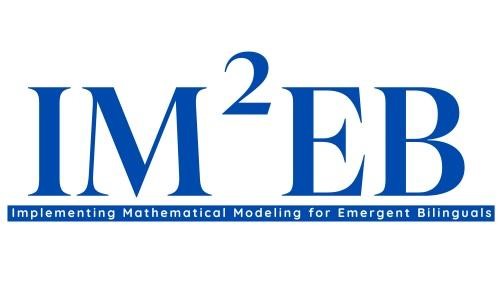 CAREER: Implementing Mathematical Modeling for Emergent Bilinguals
CAREER: Implementing Mathematical Modeling for Emergent Bilinguals
PI: Ji Yeong I
Grade Levels: 9–12
Project Description: This project aims to support secondary math teachers in teaching mathematical modeling to Emergent Bilingual (EB, a.k.a. English Learners, ELs) students. Research shows that EB students are often limited to procedural instruction despite the benefits of engaging in complex, real-world mathematical tasks. The project addresses this by engaging teachers in collaborative and situated professional development through co-planning, co-teaching, and co-reflecting with researchers experienced in EB instruction. The intervention emphasizes high cognitive demand tasks integrating mathematical and linguistic support. As a curriculum framework, this project created the 5-Act Task utilizing Dan Meyer’s 3-Act Task by adding Act 0 (assessing students' understanding in math, language, and context to ensure their access to the math task) and Act 4 (providing EBs with opportunities to share their mathematical findings and solutions using their chosen language and formats). The project aims to improve teachers’ capacity and practices to position EB students as capable doers of mathematics through this approach.
Research Questions:
- How is secondary mathematics teachers’ positioning of EBs changed through participating in the teacher-researcher collaboration through co-developing and co-teaching mathematical modeling as well as co-analyzing students’ data?
- How is secondary math teachers’ quality of mathematical instruction changed through participating in the teacher-researcher collaboration through co-developing and co-teaching mathematical modeling?
- Is teacher-researcher collaboration through co-developing and co-teaching mathematical modeling related to EBs’ mathematical achievement?
Key Challenges and Strategies for Addressing Them: One challenge is teachers’ tendency to underestimate EB students’ abilities due to language barriers, leading to lower cognitive demand tasks. A strategy to address this is providing collaborative situated professional development through co-teaching and co-analysis of student data, helping teachers better understand EB students' potential in math. Another challenge was teachers' tendency to offer hints too early. To address this, we introduced a 3 to 5-minute exploration period in each co-teaching lesson, allowing students to grapple with algebra problems independently before teacher intervention.
Initial Findings: Before their involvement in the project, many teachers tended to provide excessive scaffolding without adequately assessing students’ mathematical capabilities. This approach often reduced the cognitive demand of tasks, as teachers prematurely offered solutions and directions, thereby limiting opportunities for students to engage deeply with the content. After participating in the project, a notable improvement in teacher knowledge and instructional practices was observed. Teachers learned to delay immediate solutions to maintain the cognitive demand level of math tasks, giving students the time to explore through reasoning and questions and make sense of tasks independently.
Our quantitative data analysis shows promising results. Participating EB students scored higher on state mathematics assessments and earned better grades in their algebra courses compared to non-participants. Additionally, pre/post-survey results revealed more positive self-positioning and improved perceptions of their teachers following their involvement in the project. These findings suggest that our approach not only enhances mathematical performance but also fosters a stronger sense of student confidence and engagement in the classroom.
Products: (educator facing)
- Publication
- I, J., Sourwine, J., Erden, C., Shrestha, S., & Araujo Grando, B. (in press). Translanguaging for building linguistically proud math classrooms. Mathematics Teacher: Learning and Teaching PK-12.
- Presentations
- I, J., Erden, C., & Sourwine, J. (2023, April). Teacher growth in mathematical quality of instruction for emergent bilinguals through collaborative professional development. In Online Paper Repository of the American Educational Research Association (AERA) 2023, Chicago, USA. https://doi.org/10.3102/2007248
- I, J., Erden, C., & Araujo Grando, B. (2022, April). Positioning emergent bilinguals in mathematics: A case study of a middle school teacher. In Online Paper Repository of the American Educational Research Association (AERA) 2022, San Diego, CA, USA. https://doi.org/10.3102/1886712
- I, J., Erden, C., & Sourwine, J. (2023, October 2). The impact of collaborative interactions on a math teacher’s positioning of emergent bilingual students. [Poster presentation]. The 45th Psychology of Mathematics Education – North America Chapter (PME–NA) 2023, Reno, Nevada, USA
- Shrestha, S., Sourwine, J., I, J., & Araujo Grando, B. (2024, September 28). Positioning of emergent bilinguals in multilingual math classroom with 5-Act tasks. [Conference presentation]. Research Conference of National Council of Teachers of Mathematics, Chicago, Illinois
- Sourwine, J., Shrestha, S., & I, J. (2024, September 25). Impact of situated professional development on a teacher’s positioning toward emergent bilinguals. [Conference presentation]. Research Conference of National Council of Teachers of Mathematics, Chicago, Illinois
- I, J., Sourwine, J., & Araujo Grando, B. (2023, June 22). Implementation and impact of translanguaging for emergent bilinguals in algebra 1. [Conference presentation]. TODOS 2023 Conference, Albuquerque, NM.
- I, J., Erden, C., Sourwine, J., & Araujo Grando, B. (2022, September 28). Increasing math voices of emergent bilinguals by implementing 5-Act tasks. [Conference presentation]. Research Conference of National Council of Teachers of Mathematics, Los Angeles, California.
- I, J., Erden, C., Sourwine, J., & Araujo Grando, B. (2022, September 30). Explore algebra modeling problems designed for emergent bilinguals. [Conference presentation]. Annual Meeting of National Council of Teachers of Mathematics, Los Angeles, California.
- I, J., Erden, C., & Araujo Grando, B. (2022, February 12). Math teacher positioning on emergent bilinguals in situated professional development. [Conference presentation]. Association of Mathematics Teacher Educators Conference, Las Vegas, Nevada.
- Martinez, R., I, J., & Araujo Grando, B. (2022, January 7). Acts towards entry, engagement and empowerment for/with emergent bilinguals. [Conference presentation]. Research Conference of National Council of Teachers of Mathematics (Virtual).
- Araujo Grando, B., I, J., & Martinez, R. (2021 May 1st). Modeling-based lessons for teaching math to English learners. [Conference presentation]. National Council of Teachers of Mathematics (Virtual).
- I, J. (2022, October 15). Transform textbook problems to 5-Act task for emergent bilinguals. [Conference presentation]. Iowa Council of Teachers of Mathematics, Ankeny, IA.
- I, J. (2023, October 14) From language barrier to linguistic resource: A guide to transforming your perspective on teaching math to emergent bilinguals. [Conference presentation]. Iowa Council of Teachers of Mathematics Conference, Ankeny, IA.
 Developing Concept of Variable Among Students with Mathematics Difficulties in Preparation for Algebra 1
Developing Concept of Variable Among Students with Mathematics Difficulties in Preparation for Algebra 1
PI: Sarah Krowka
Grade Level: 8
Project Description: Understanding variables is not only critical to learning algebra but is also interwoven throughout grade 8 mathematics domains (e.g., functions, geometry) that are foundational to algebra coursework. The Algebra Core Concepts (ACC) intervention aims to develop students’ concept of variable as they learn to interpret and evaluate expressions, represent real-life mathematical word problems using algebraic notation, and solve equations. The intervention targets students with mathematics difficulties (MD) in grade 8, including students with and without disabilities.
The intervention utilizes evidence-based practices for students with MD (e.g., use of representations) and includes a series of mathematical tasks designed to engage students and build their learning in foundational algebra content with an emphasis on concept of variable. The lessons center instruction on key algebra standards (i.e., interpreting and evaluating expressions and representing and evaluating real-life mathematical word problems with algebraic notation).
Research Questions:
- What is the impact of the intervention on variable understanding and misconceptions for students with MD?
- What is the impact of the intervention on general algebra knowledge for students with MD?
Key Challenges and Strategies for Addressing Them: Gaining and maintaining student interest and engagement, particularly over the long term, can be difficult. This may be especially true if instructional content is not seen as relevant or engaging by the students. We have paid special attention to making intervention lessons engaging for students by using instructional practices such as hands-on activities and real-world tasks
Establishing a Partnership Between a Rural School and an Urban University to Support Algebra 1 Learning for Students with Learning Disabilities
PI: Casey Hord
Grade Levels: 9–12
Project Description: This project seeks to explore the process of creating a partnership between a university and rural high school through the perspectives of school, community, and university stakeholders. The project utilizes undergraduate preservice teacher field experiences to provide tutoring in Algebra I for a rural high school. Prior research indicates that tutoring programs are mutually beneficial for the undergraduates, the partner school, and, ultimately, the students served through the tutoring. However, creating and sustaining such programs in rural settings presents logistical and programmatic challenges, including maintaining the program over large distances and engaging with rural educators who often “wear many hats.” This project approaches the creation of a school-university partnership from a strengths-based framework where the goals and methods of implementation are co-created with the local school staff and community. This approach seeks to build upon the assets of the local school, particularly their knowledge of the students, what needs they have, and what teaching strategies have been effective. To ensure that the partnership reflects the interests and values of the local community, we have engaged an advisory board of community members to evaluate and provide feedback on the project. Through collaboration with these individuals, the project also seeks to research ways to sustain this school-university partnership.
Key Challenges and Strategies for Addressing Them: Logistics and communication have been the primary challenges that we have found in piloting a school-university partnership with a rural school. So far, we have found that early collaborative planning with local school staff and the undergraduate tutors allows us to meet the main logistical challenge of scheduling. Also, we have found that having a point person with a knowledge of the local school and community has assisted in establishing and maintaining consistent communication between the school and university. In addition, collaborating with the local school staff in creating the program allows those individuals to also supervise and provide feedback for the undergraduate tutors.
Advice for Researchers: Our work on gestures and strategic questioning has led to some important findings on how students with learning disabilities and other struggling learners can be supported and eventually thrive in Algebra 1. We also have learned to focus on helping our tutors refresh their knowledge of Algebra 1 content. We have also learned to prepare for secondary school students experiencing math anxiety at times when engaging with Algebra 1. While addressing students’ struggles with effective teaching strategies can indirectly reduce students’ anxiety as they experience more success with Algebra 1, we have also learned to integrate some stress management strategies from cognitive and clinical psychology. We sometimes combine mindfulness and high-quality instruction to support students’ movement into “upward spirals” in their work as they improve in their academic performance and belief in themselves as mathematics learners.
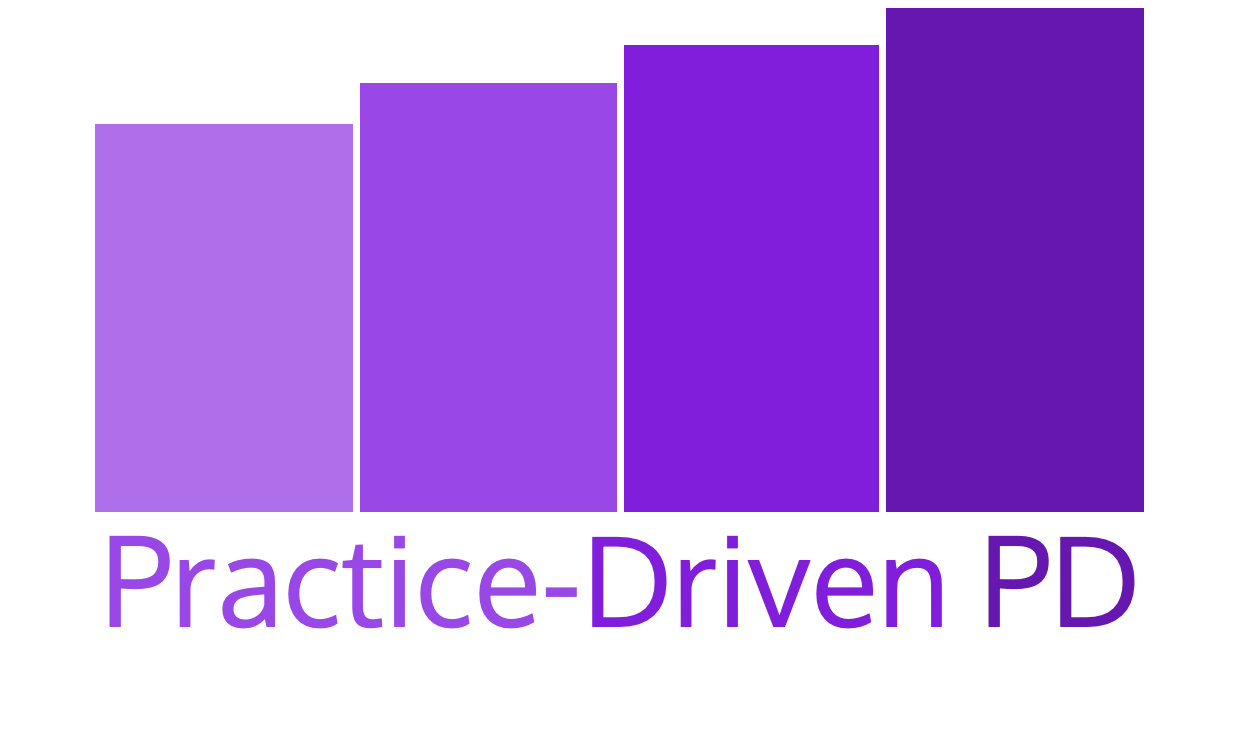 Practice-Driven Professional Development for Algebra Teachers
Practice-Driven Professional Development for Algebra Teachers
PI: Zandra de Araujo
Grade Levels: 8–10
Project Description: The Practice-Driven PD project aims to help teachers improve their instructional practice by offering small suggestions for improvement rooted in teachers’ existing practice. These suggestions, which we refer to as instructional nudges, are small in scope, aligned with teachers’ existing instructional practice, and are designed so that teachers have a high likelihood of implementing them with success. Instructional nudges are delivered via one-page PDFs, which clearly and succinctly describe how to enact the nudge, what is involved, and why a teacher might try it in their classroom; share either an example, illustration, or video describing the instructional nudge; and more. The one-page PDFs were designed for teachers to consume in less than five minutes. We are currently collecting data on which of the 18 instructional nudges have the greatest uptake among teachers, their impact on instruction, and student outcomes. This approach to PD is innovative because it embodies an incremental approach to teacher improvement. Rather than asking teachers to make transformational shifts in their existing practice, we instead recognize that teachers are already doing good things in their classrooms, and we want to build, incrementally, from where they are currently. Improving one’s practice incrementally is an idea researchers have begun to explore (Litke, 2020; Star 2016), and this project builds upon it. It is our belief that by asking teachers to make small shifts in their instruction, allowing for choice, and building from their current instruction, we can develop a PD model that sustainably scales to reach many teachers rather than a select few.
Research Questions:
- In what ways does teachers’ participation in the PD impact their instructional practices?
- Do students of teachers who participate in the PD demonstrate differential growth in learning outcomes?
- Do students of teachers who participate in the PD have increased rates of homework completion?
- Do students of teachers who participate in the PD have increased engagement during independent work time?
Key Challenges and Strategies for Addressing Them: One of the biggest challenges is identifying the right grain-size for an instructional nudge so that it has high uptake among teachers. As mathematics educators, it is easy to surface a nudge idea that is too transformational or too far removed from teachers’ existing practice. One of our assumptions is, if a nudge is too far removed from a teacher’s existing practice, then it will not be taken up. One way we mitigated this challenge was by using an iterative design process involving our team, classroom teachers, and advisory board members. We often started by generating nudge ideas individually, then bringing them to the team to discuss, modify, or sometimes reject. The nudge ideas that made it through our team were then shared with teachers and our advisory board, who gave feedback. This often meant reducing the instructional suggestion’s size or shifting the scope to meet the needs of teachers accordingly.
Another challenge is measuring uptake of instructional nudges because, by design, they are small in scope and built from teachers’ existing practice. Nudges are presented in one-page PDFs, which purposefully allow teachers to adapt them to fit their own contexts and situations. Thus, it has been challenging to know if a teacher is indeed enacting a nudge or if what they are doing is a part of their regular instruction. To navigate this challenge, we are collecting click data on an online platform to understand their patterns of use (i.e., which nudges they click on). We are also using survey, interview, and observation data to triangulate the click data to more fully understand participants' use of the nudges.
Advice for Researchers: Algebra instruction by and large, is quite conventional. As a field, we need to find ways to aid students in the transition from arithmetic to algebra by tapping into their knowledge and skills developed in elementary school. I think others should consider ways of better bridging elementary and secondary methods and approaches to instruction as we try to improve students’ experiences with algebra.
Initial Findings: Instructional nudges participants can enact immediately, with no preparation, are the ones that tend to get taken up more readily. Some of our instructional nudges involve adding a problem to a worksheet, which requires the teacher to prepare ahead of time. Other instructional nudges suggest a teacher action or pedagogical move, which can be done with little to no preparation.
Teachers more readily take up instructional nudges that align with their existing practice. Some of our instructional nudges are better suited for a specific type of instructional format such as direct instruction, individual work time, or group work time. Teachers who tended to privilege a certain type of instructional format would tend to select nudges that aligned with that type of format. For example, one of our nudges involves a suggestion for how students could work collaboratively in groups. This instructional nudge was not used by teachers who did not do group work in their classrooms.
Some instructional nudges are more memorable than others. When designing the instructional nudges, we tried to name them creatively and provide a catchy hook (i.e., tagline, catchphrase), the thought being that a teacher could get a quick sense of what the instructional nudge entailed and would remember it. In interviews with our pilot cohort, there was a subset of the instructional nudges that participants readily recalled. There was also a subset of instructional nudges that they did not remember and had to be reminded.
Products:
- Practice-Driven PD Website (educator facing)
- Publications
- Stewart, M. N., Brown, N., Candela, A., de Araujo, Z., Otten, S. (in-press). Rate and review. Mathematics Teacher: Learning and Teaching PK-12.
- Wonsavage, F. P., Otten, S. A., Candela, A. G., & de Araujo, Z. (2024). The modality of mathematics lesson observations: Comparing the results of live and video-based coding. International Journal of Research and Method in Education. 1–20. https://doi.org/10.1080/1743727X.2024.2350068
- Wonsavage, F. P., de Araujo, Z., Candela, A. G., & Otten, S. (2024). Mining gems to inspire teacher reflection. The Centroid, 50(1), 9–12. https://www.ncctm.org/activities/the-centroid1/centroid-issue-archive/fall-2024/
- Presentations
- Otten, S., Stewart, M., Wambua, M., Candela, A. G., & de Araujo, Z. (2024, February). Comparing one-page documents, social media posts, and videos as delivery formats for instructional nudges. Presentation at the Association of Mathematics Teacher Educators Annual Meeting in Orlando, FL.
- Candela, A. G., Stewart, M., Wambua, M., Baah, F., de Araujo, Z., Wonsavage, F.P., & Otten, S. (2024, February). Nudging teachers and tasks to enhance students' mathematical engagement and understanding. Presentation at the Association of Mathematics Teacher Educators Annual Meeting in Orlando, FL.
- Wonsavage, F. P. (2023, November). Searching for hidden gems. Presentation at the annual meeting of the North Carolina Council of Teachers of Mathematics, Winston-Salem, NC.
- Candela, A. G. (2023, December). Nudging Towards Student Engagement. Presentation at the annual meeting of the Missouri Council of Teachers of Mathematics, Columbia, MO.
- Baah, F., Candela, A. G., Otten, S., & de Araujo, Z. (2023, December). Instructional strategies to initiate students’ thinking. Presentation at the annual meeting of the Missouri Council of Teachers of Mathematics, Columbia, MO.
- Stewart, M., Otten, S., Candela, A. G., & de Araujo, Z. (2023, December). Where are they at? Making sense of student progress. Presentation at the annual meeting of the Missouri Council of Teachers of Mathematics, Columbia, MO.
- Wambua, M., de Araujo, Z., Candela, A. G., & Otten, S. (2023, December). Using worked examples and classroom resources to support student engagement and autonomy. Presentation at the annual meeting of the Missouri Council of Teachers of Mathematics, Columbia, MO.
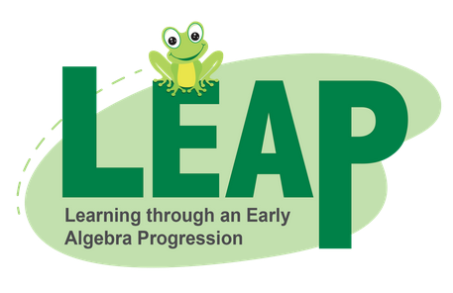 The Impact of an Inclusive Grades K-2 Early Algebra Intervention Implemented by Classroom Teachers
The Impact of an Inclusive Grades K-2 Early Algebra Intervention Implemented by Classroom Teachers
PI: Maria Blanton
Grade Levels: K–2
Project Description: The Impact of an Inclusive Grades K–2 Early Algebra Intervention Implemented by Classroom Teachers is a large-scale, randomized study of the effectiveness of the Grades K–2 early algebra “LEAP” curriculum when taught by elementary teachers as a supplement to their regular mathematics instruction. The three-year longitudinal study is currently being implemented in 41 schools and follows a cohort of students from kindergarten through grade 2. The LEAP curriculum develops children’s algebraic thinking around four key practices: Generalizing, representing, justifying, and reasoning with mathematical structure and relationships. The development of children’s algebraic thinking beginning in kindergarten promises to help mitigate the excessive failure rates in high school algebra that have resulted from more traditional “arithmetic-then-algebra” approaches. However, current math curricula in the elementary grades do not adequately address algebraic thinking. Effective models of early algebra instruction are needed, particularly for students from underserved communities who typically have less access to the kinds of curricula and instruction that can lead to success in algebra. Understanding the LEAP curriculum’s effectiveness and how teachers might implement it with fidelity for diverse learners is essential to broadening participation in STEM disciplines. The grades 3–5 LEAP curriculum developed in prior research has been shown to significantly increase students’ algebra readiness for middle grades, including for students from low-resourced communities. The combined grades K–5 LEAP curriculum promises to provide teachers with an effective curricular roadmap for building all children’s algebraic thinking.
Research Questions:
- Student Achievement: To what extent do students across diverse classrooms who are taught the K–2 LEAP curriculum during regular instruction significantly outperform students who receive only regular instruction on measures of algebra knowledge and general mathematics knowledge?
- Fidelity of Implementation: What is the fidelity with which teachers implement the curriculum, what aspects do they implement with high or low fidelity, and how do variations in teachers’ fidelity of implementation relate to variations in students’ performance?
Key Challenges and Strategies for Addressing Them: The most significant challenge has been working in a school culture that doesn’t always recognize the importance of math (STEM) education for young learners relative to literacy education. This is not unique to early algebra. More is needed around policy initiatives, teacher/administrator training, and so forth to increase the role and significance of STEM education in the elementary grades.
A significant challenge for this project is the large-scale assessment of young learners who cannot take written assessments on their own (we anticipate approximately 4000 student participants in kindergarten). To make this process manageable, we chose to develop digital assessments for students ages 5–7 as our primary data source. We will also interview a randomly selected subset of these students for a more in-depth look at students’ thinking.
Advice for Researchers: We have found it important to have a clear conceptual framework that characterizes the “algebra” we want young children to learn. Our framework is based on the treatment of algebra as a set of four essential thinking practices: generalizing, representing, justifying, and reasoning with mathematical structure and relationships. Using these practices as the underlying framework in our design of learning goals, curriculum, and assessments has led to a more connected and internally consistent treatment of early algebraic concepts in our research and in the products we’ve developed.
In our view, true algebra reform should begin in the elementary grades. We think it can be problematic to draw conclusions about the role of algebra in middle grades or high school without attending to algebra’s treatment (or lack thereof) in elementary grades. We would advocate for caution around enacting algebra reforms that begin in middle grades without comparable reforms in the elementary grades.
Products:
Related Resources
- 2019 Spotlight on Algebra Education
- Algebra in the Early Grades: Setting the Stage for Future Studies and a Math Mindset | Blog post by Colleen Henry (2019)
- Related Spotlights